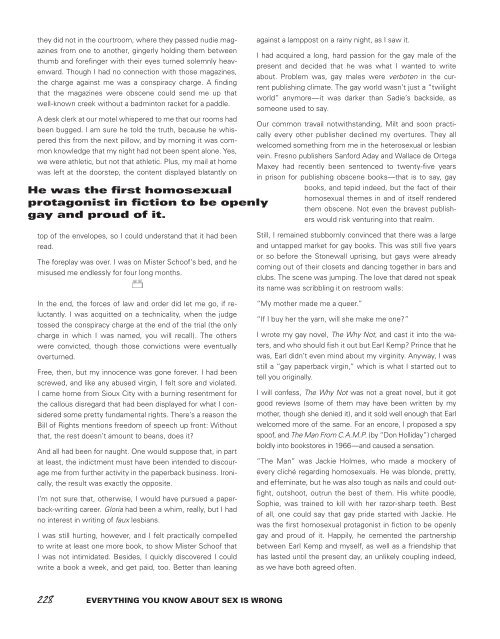Create successful ePaper yourself
Turn your PDF publications into a flip-book with our unique Google optimized e-Paper software.
they did not in the courtroom, where they passed nudie magazines<br />
from one to another, gingerly holding them between<br />
thumb and forefinger with their eyes turned solemnly heavenward.<br />
Though I had no connection with those magazines,<br />
the charge against me was a conspiracy charge. A finding<br />
that the magazines were obscene could send me up that<br />
well-known creek without a badminton racket for a paddle.<br />
A desk clerk at our motel whispered to me that our rooms had<br />
been bugged. I am sure he told the truth, because he whispered<br />
this from the next pillow, and by morning it was common<br />
knowledge that my night had not been spent alone. Yes,<br />
we were athletic, but not that athletic. Plus, my mail at home<br />
was left at the doorstep, the content displayed blatantly on<br />
He was the first homosexual<br />
protagonist in fiction to be openly<br />
gay and proud of it.<br />
against a lamppost on a rainy night, as I saw it.<br />
I had acquired a long, hard passion for the gay male of the<br />
present and decided that he was what I wanted to write<br />
about. Problem was, gay males were verboten in the current<br />
publishing climate. The gay world wasn’t just a “twilight<br />
world” anymore—it was darker than Sadie’s backside, as<br />
someone used to say.<br />
Our common travail notwithstanding, Milt and soon practically<br />
every other publisher declined my overtures. They all<br />
welcomed something from me in the heterosexual or lesbian<br />
vein. Fresno publishers Sanford Aday and Wallace de Ortega<br />
Maxey had recently been sentenced to twenty-five years<br />
in prison for publishing obscene books—that is to say, gay<br />
books, and tepid indeed, but the fact of their<br />
homosexual themes in and of itself rendered<br />
them obscene. Not even the bravest publishers<br />
would risk venturing into that realm.<br />
top of the envelopes, so I could understand that it had been<br />
read.<br />
The foreplay was over. I was on Mister Schoof’s bed, and he<br />
misused me endlessly for four long months.<br />
In the end, the forces of law and order did let me go, if reluctantly.<br />
I was acquitted on a technicality, when the judge<br />
tossed the conspiracy charge at the end of the trial (the only<br />
charge in which I was named, you will recall). The others<br />
were convicted, though those convictions were eventually<br />
overturned.<br />
Free, then, but my innocence was gone forever. I had been<br />
screwed, and like any abused virgin, I felt sore and violated.<br />
I came home from Sioux City with a burning resentment for<br />
the callous disregard that had been displayed for what I considered<br />
some pretty fundamental rights. There’s a reason the<br />
Bill of Rights mentions freedom of speech up front: Without<br />
that, the rest doesn’t amount to beans, does it?<br />
And all had been for naught. One would suppose that, in part<br />
at least, the indictment must have been intended to discourage<br />
me from further activity in the paperback business. Ironically,<br />
the result was exactly the opposite.<br />
I’m not sure that, otherwise, I would have pursued a paperback-writing<br />
career. Gloria had been a whim, really, but I had<br />
no interest in writing of faux lesbians.<br />
I was still hurting, however, and I felt practically compelled<br />
to write at least one more book, to show Mister Schoof that<br />
I was not intimidated. Besides, I quickly discovered I could<br />
write a book a week, and get paid, too. Better than leaning<br />
Still, I remained stubbornly convinced that there was a large<br />
and untapped market for gay books. This was still five years<br />
or so before the Stonewall uprising, but gays were already<br />
coming out of their closets and dancing together in bars and<br />
clubs. The scene was jumping. The love that dared not speak<br />
its name was scribbling it on restroom walls:<br />
“My mother made me a queer.”<br />
“If I buy her the yarn, will she make me one?”<br />
I wrote my gay novel, The Why Not, and cast it into the waters,<br />
and who should fish it out but Earl Kemp? Prince that he<br />
was, Earl didn’t even mind about my virginity. Anyway, I was<br />
still a “gay paperback virgin,” which is what I started out to<br />
tell you originally.<br />
I will confess, The Why Not was not a great novel, but it got<br />
good reviews (some of them may have been written by my<br />
mother, though she denied it), and it sold well enough that Earl<br />
welcomed more of the same. For an encore, I proposed a spy<br />
spoof, and The Man From C.A.M.P. (by “Don Holliday”) charged<br />
boldly into bookstores in 1966—and caused a sensation.<br />
“The Man” was Jackie Holmes, who made a mockery of<br />
every cliché regarding homosexuals. He was blonde, pretty,<br />
and effeminate, but he was also tough as nails and could outfight,<br />
outshoot, outrun the best of them. His white poodle,<br />
Sophie, was trained to kill with her razor-sharp teeth. Best<br />
of all, one could say that gay pride started with Jackie. He<br />
was the first homosexual protagonist in fiction to be openly<br />
gay and proud of it. Happily, he cemented the partnership<br />
between Earl Kemp and myself, as well as a friendship that<br />
has lasted until the present day, an unlikely coupling indeed,<br />
as we have both agreed often.<br />
228 EVERYTHING YOU KNOW ABOUT SEX IS <strong>WRONG</strong>


